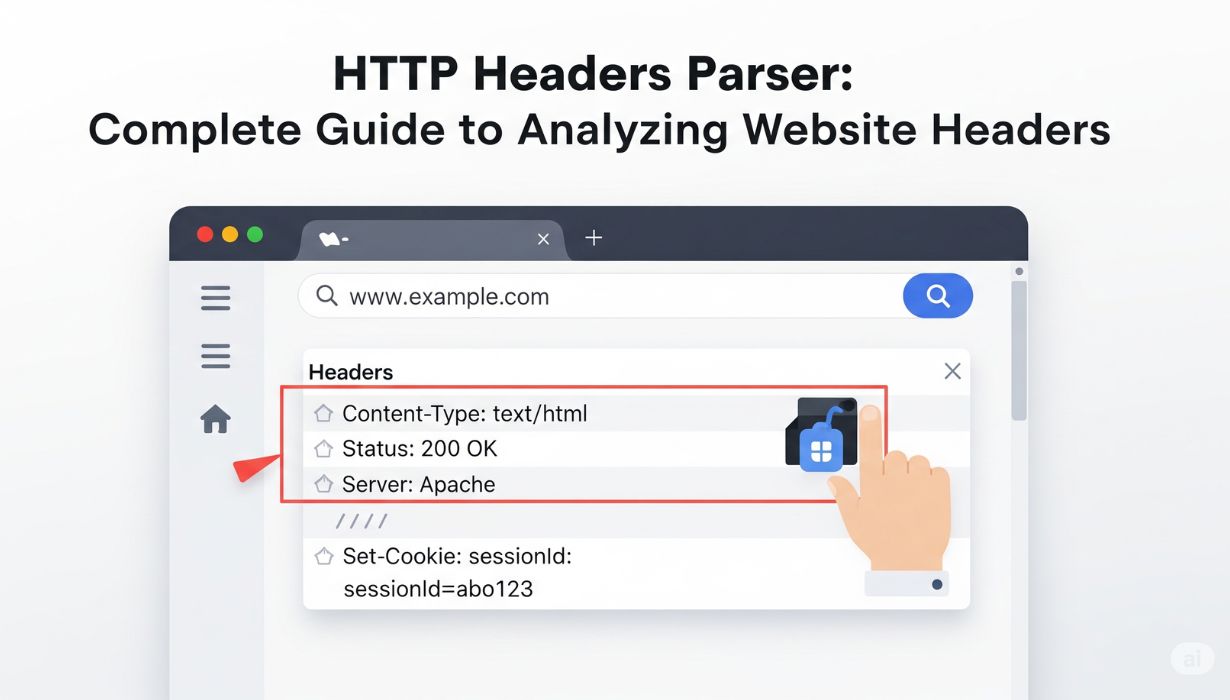
26
HTTP Headers Parser: How It Works, Benefits, and Best Free Tools
Learn what an HTTP Headers Parser is, how it works, and why it’s essential for debugging, SEO, performance, and website security
HTTP Haders Parser Complete Guide to Analyzing Website Headers
When you visit a website your browser and the server exchange information through something called HTTP headers These headers carry important details about the request and the response, such as content type security polcies cache settings cookies and server behavior
For developers marketers, and security experts, understanding headers is crucial. But reading them in raw format can be confusing. This is where an HTTP Headers Parser becomes essential
In this guide, we’ll explain what an HTTP Headers Parser is, how it works, why it matters, and how you can use it to improve performance, security, and SEO
What Is an HTTP Headers Parser
An HTTP Headers Parser is a tool that reads and interprets the headers exchanged between a browser client and a web server. Instead of showing you raw technical strings it organizes the data into a clean understandable format
Why HTTP Headers Matter
HTTP headers may look invisible to normal users, but they control a lot of things “behind the scenes”:
- Content delivery: Tells the browser what type of file is being sent.
- Caching: Controls how long files are stored in browsers.
- Security: Sets rules like HTTPS enforcement, CORS, or CSP.
- SEO: Search engines use headers like redirects and status codes to rank pages.
- Cookies: Manage sessions, user preferences, and tracking.
How an HTTP Headers Parser Works
An HTTP Headers Parser retrieves and analyzes headers in three main steps
Send a request: The tool makes a request to the target website
Receive response headers: The server replies with metadata about the content
Parse the headers: The tool organizes and explains each header in plain English
Some parsers also analyze request headers (from the browser) in addition to response headers (from the server
Benefits of Using an HTTP Headers Parser
1. Debugging Websites
If your website loads incorrectly, headers may reveal the problem—for example, a wrong content type or redirect loop.
2. Improving Security
Security headers like Strict-Transport-Security, X-Frame-Options, and Content-Security-Policy protect users A parser shows if they’re missing or misconfigured
3. SEO and Performance
Haders affect search engine crawling and site speed For instance
Cache-Control improves performance
301/302 redirects influence SEO rankings
4. Testing API Responses
Developers can inspect API requests and responses to ensure data is transferred correctly
5. Transparency
Understanding headers makes it easier to know how servers, browsers, and third-party tools interact
Common HTTP Headers Explained
General Headers
Date Shows when the response was sent
Server: Reveals the server software (Apache, Nginx, et
Response Headers
Content-Type Defines file type HTML JSON CSS etc
Cache Control Tells the browser how long to cache the response
Set-Cookie: Stores session or userspecific data
Strict-Transport-Security: Enforces HTTPS for security
Request Headers
User-Agent: Identifies the device and browser
Accept-Language: Preferred language settings
Authorization: Sends credentials or tokens
Free Online HTTP Headers Parser Tools
Here are some popular free options
WebSniffer – Simple header viewer
SecurityHeaders.io – Focuses on security headers
cURL command line Developers use it for quick header checks
Browser DevTools – Built into Chrome and Firefox
Header Checkers by SEO tools – Combine SEO + header analysis
How Businesses Use HTTP Headers Parsers
Web Developers
Check content delivery, redirects, and MIME types
Security Analysts
Ensure all critical security headers are present
SEO Experts
Analyze redirects, canonical tags, and indexing rules
Marketing Teams
Understand tracking headers and cookies for campaigns
Security Risks Revealed by Headers
Sometimes headers expose too much information, such as server type or version. Attackers may exploit this. A parser helps you see what your server is revealing and fix it
Freqently Asked Questions
1. Is an HTTP Headers Parser free to use
Yes many tools are free Some advanced features require paid plans
2. Can I check headers without a parser?
Yes, using browser developer tools or command line, but a parser makes it easier
3. Do headers affect SEO
Yes—status codes, caching, and canonical headers all impact rankings
4. Are HTTP headers the same as meta tags?
No. Headers are server-side instructions, while meta tags are part of the webpage content.
5. Can I hide server information in headers?
Yes, you can configure servers to remove or mask sensitive details
Conclusion
An HTTP Headers Parser is an essential tool for anyone managing websites APIs or online businesses It translates raw header data into a clear human readable format helping you detect errors strengthen security improve SEO, and ensure smooth performance
Whether you’re a developer security specialist or marketer using a headers parser gives you insights into how your site communicates with browsers—and helps you stay in contro
Contact
Missing something?
Feel free to request missing tools or give some feedback using our contact form.
Contact Us